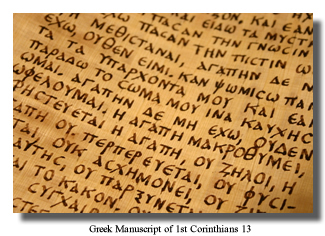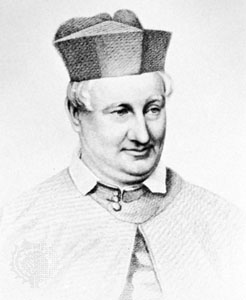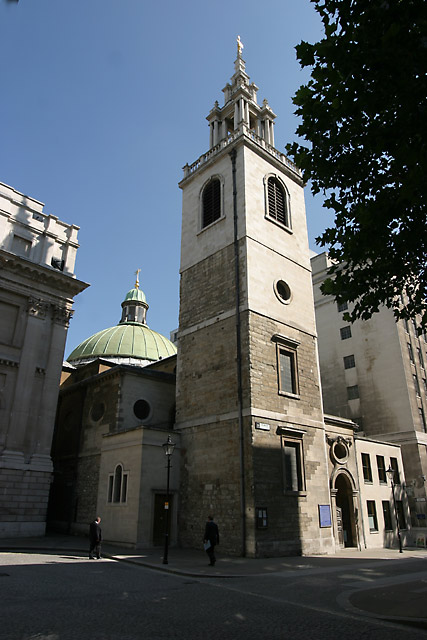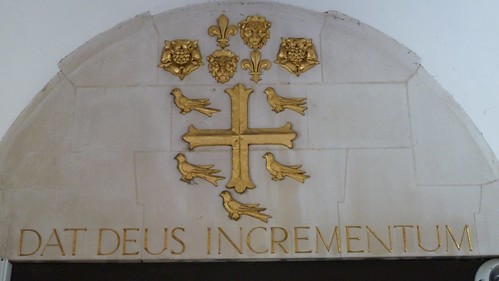Academic background
Roger Fenton was born in 1565 in Lancashire and was educated at Pembroke Hall, Cambridge, where he matriculated as a sizar in 1585. Four years later he graduated B.A. and became a fellow in 1590. Subsequently awarded an M.A. he then narrowed his studies to divinity and proceeded B.D. in 1602. With another eleven years of study he received a D.D. in 1613. Meanwhile in 1601 he became the rector of St. Stephen's Church, Walbrook, also of the neighbouring St. Benet's Sherehog in 1603. In his work there over many years there he was described as “the painful, pious, learned, and beloved minister.” He moved on from Walbrook to the vicarage of Chigwell, Essex in 1606. Three years later, he succeeded Lancelot Andrewes in the prebend of St. Pancras in St. Paul's, which thus made him rector and patron, as well as vicar, of Chigwell. St Stephen's is thought by some to be the finest of the church buildings of Sir Christopher Wren. One of its vicars started the Samaritan movement.
Sermon Publications
Fenton was preacher to the readers at Gray's Inn, starting 1598, and he held the post for the rest of his life. The Elisabethan period is considered the "golden age" of this Inn of lawyers, and the Queen is its Patron Lady. Fenton was a popular preacher of the day; His first work was 'An Answer to William Alablaster, his Motives,' 1599. Fenton prefaces his work with a short note where ‘he wisheth health of soule and bodie' to William Alabaster, languishing in the Tower of London, 1598/99. He sets out to counter the arguments that Alabaster had use to justify his conversion to Roman Catholicism. These counter-arguments may have been persuasive, as Alabaster eventually gave up Catholicism, and was favoured by James I.
William Alabaster
www.thepoetsgarret.com
Another of his sermons, 'Of Simonie and Sacriledge,' was published in 1604. The context of the sermon shows he was at that time chaplain to Sir Thomas Egerton, the Lord Chancellor. A third work was 'A Treatise of Usurie,' in three books, published the same year as the KJV, and there is some evidence it was dedicated to Sir Francis Bacon, also a member of Gray‘s Inn. Fenton’s views on the morality or otherwise of usury were taken up forty years after publication in a tract by Sir Robert Filmer entitled 'Quaestio quodlibetica, or, A discourse, whether it may bee lawfull to take use for money.' This bears the sub-title, 'An Examination of Dr. Fenton's Treatise of Usury.' The author quotes Dr. Fenton and Dr. Andrewes as two of the most noted opponents of usury in England. Although Fenton’s views on usury were attacked after he died, 16 Jan. 1615, they were more than adequately defended by the Bishop of London, John King. Fenton’s successor at Chigwell, one Emmanuel Utie, published another of Fenton’s sermons posthumously, called 'A Treatise against the Necessary Dependance upon that One Head and the present Reconcilation to the Church of Rome. Together with certaine sermons preached in publike assemblies.' Three of these sermons had been preached before King James.
Yet another sermon was published in 1615, 'Upon Oathes,' preached before the Grocers' Company; and a small volume containing four more appeared in 1616.
Utie's dedication piece spoke of Fenton's merits as a preacher and writer, acknowledging 'that judgement which was admired of every side,' and saying that his style with words had '. . . naked innocencie without affectation and . . natural majestie,’ the manner of his honey-producing industry was ‘like a master bee without a sting.'
Hawaiihoneybee.wordpress.com
Translating the Bible
We have seen that Roger Fenton, like many of the translators, had patrons in high places. His ministry was located in London, so he was a natural choice to be one of seven men who formed the second Westminster company - led by William Barlow - with the task of translating the New Testament epistles.
Final Appreciation
Nicholas Felton, Master of Pembroke said of Fenton:
None was fitter to dive into the depths of school divinity. He was taken early from the University, and had many troubles afterward; yet he grew and brought forth fruit. Never a more learned hath Pembroke Hall brought forth, with but one exception.
He was referring to Bishop Lancelot Andrews. Fenton died January 16th, 1616, at the age of fifty. He had suffered much with poor health, probably owing to sedentary habits. Says Fulton, his friend,
In the time of his sickness, I told him that his weakness and disease were trials only of his faith and patience. "Oh no," he answered, Non probationes, sed castigationes. - “they are not trials but corrections.”
His body was buried under the communion-table of St. Stephen’s, where his parishioners erected a monument to his memory, inscribing their affection toward their pastor as one eminent in both piety and learning.
"Fenton, Roger". Dictionary of National Biography. London: Smith, Elder & Co. 1885–1900.
Steve Cadman
squidoo.com
This is 36/52 previous next index












